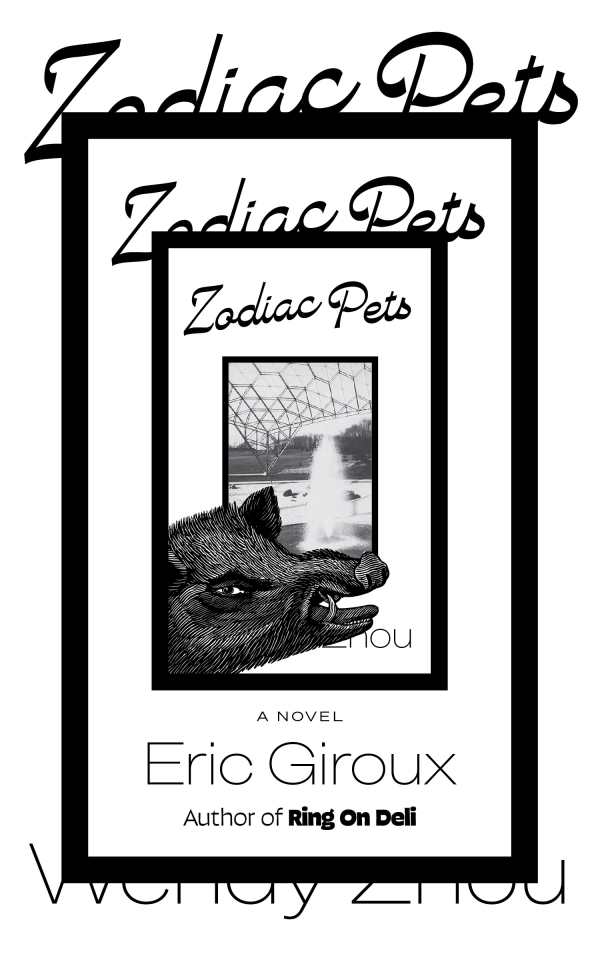It looks like you've stumbled upon a page meant to be read by our code instead of viewed directly. You're probably looking for this page.
Zodiac Pets
A town and its residents are thrust into crisis by the ambitious plans of a wealthy resident in the insightful novel Zodiac Pets.
In Eric Giroux’s exciting novel Zodiac Pets, a student writer and her editor come to terms with their identities in a town that’s facing seismic changes.
Pennacook is a small New England community where traditions are embraced, change is met with skepticism, and people are “hooked on the message of contorting politicians who said nothing had changed and the country was still perfect.” In this environment, Wendy, who’s in middle school, contends with being one of the few Asian Americans around; further, she’s a lesbian in a town with no visible LGBTQ+ support. Wendy finds solace and confidence in her writing, which leads her to join the local paper, The Beat, as a student reporter—one of several who hope to revive the paper.
But despite the students’ efforts to make improvements to the paper, The Beat‘s editor-in-chief, Graham, lets a wealthy townsperson use the paper to promote his latest venture, a plan to solve Pennacook’s flooding problem: they want to “plop some kind of geodesic dome over at least part of the town, to keep out rain and avert” the waters. When Wendy discovers that the plan is not all that it appears to be, she encourages her friends to use their nascent journalism skills to help save the town.
In time, Wendy matures from a confused student into a confident young woman. From college in 2032, she keeps a diary reflecting on her middle school efforts; she also works on her Pennacook-based roman à clef. Her diary’s insightful entries are interspersed with present-tense scenes capturing the events she reported on in Pennacook.
Though their stories don’t always connect, Graham is developed in parallel to Wendy; in an interview years later, he reflects on his actions and moral judgments in the period when the paper was struggling. And when the book is focused on the period of the initial struggles, as Wendy comes to understand and express her attraction to other girls, Graham learns to embrace his proclivity toward unconventional sexual relationships (he likes to be dominated and has multiple partners at once, taking the novel past mere coming-of-age territory). Further, the characters’ understandings of democracy and connection to the United States are also paralleled: Wendy’s experiences as the child of a Chinese immigrant contrast with Graham’s experiences as a descendant of a historic family to interesting effect.
In the end, Wendy’s and Graham’s concerns are a microcosmic representation of the town’s identity crisis—because Pennacook is evolving too. When it comes to depicting the town, the prose is vibrant, reveling in descriptions of an abandoned supermarket that’s covered in overgrown organic matter, for example, where the robots once employed as shelf-stockers and cart-gathers operate as if the store was still open. Such inventive details render Pennacook distinctive and intriguing. And the prose has unusual, memorable beats: “china plates with aster on their lips,” “whiteboard scribblings,” and the “rancid and familiar tang waft[ing] from the trees.” As Wendy, Graham, and the people of Pennacook come to terms with their respective roles in shaping the town’s story, the book reaches a satisfying conclusion.
A story of crossgenerational struggles to come into one’s own, Zodiac Pets is an engaging novel.
Reviewed by
Gail Hoffer-Loibl
Disclosure: This article is not an endorsement, but a review. The publisher of this book provided free copies of the book and paid a small fee to have their book reviewed by a professional reviewer. Foreword Reviews and Clarion Reviews make no guarantee that the publisher will receive a positive review. Foreword Magazine, Inc. is disclosing this in accordance with the Federal Trade Commission’s 16 CFR, Part 255.
